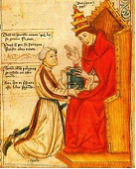 Pedro López de Ayala, sometimes called Don Pero López de Ayala, was a medieval Castilian poet, born in the 14th century. Additionally, during his long lifetime, he served his country as chancellor and statesman, and was a royal courtier. As was the custom in other countries in those days, being a learned man, he also acted as chronicler and historian, recording major events for future generations.
Pedro López de Ayala, sometimes called Don Pero López de Ayala, was a medieval Castilian poet, born in the 14th century. Additionally, during his long lifetime, he served his country as chancellor and statesman, and was a royal courtier. As was the custom in other countries in those days, being a learned man, he also acted as chronicler and historian, recording major events for future generations.
It is believed that he was born in the year 1332, in Vitoria, into one of the rich and aristocratic families of the Spanish province of Castile. They were said to be of Jewish “converso” descent. It was common in medieval times for Jewish people in Spain and Portugal to be coerced into converting to the Catholic faith, often under pain of death. This cannot be confirmed with absolute certainty though as some records exist that the family may have originated from Christian royalty in the Pyrenees region.
López de Ayala received a private education courtesy of his uncle, a Cardinal by the name of Pedro Gómez Barroso. In early adult life he was a military man, fighting on the side of Henry of Trastamara who was attempting to gain the Castilian throne. He was entrusted at one point to go to France and to be part of the negotiations to forge a coalition against the Portuguese and the English.
Not surprisingly he was captured and imprisoned more than once during the military campaigns in which he fought. In 1385, for example, he was detained in Portugal following a Battle in Aljubarrota. He used his time of incarceration to write part of a book and also completed another on the subject of hunting with birds of prey. This was seen as a comprehensive guide to the art of falconry. Here is an extract from the prologue to the book:

He had friends in very high places though, including both the kings of France and Castile, and they secured his release on payment of a large ransom demand. This period of imprisonment lasted at least three years and, on his release, López de Ayala resumed his diplomatic duties in France before a triumphant return to his homeland saw him honoured by his king, Henry III. He was installed as canciller mayor.
He spent a great deal of time in royal court circles and set down many of his observations of this life in a didactic and satirical book called “Palace Verse” or “Rhymes of the Court”. This contained many fairly acidic descriptions of how other court followers went about their daily lives, focusing on their political and religious views and their social habits. He also reflected on his own misspent youth, as indicated in the following lines from Rimado de Palacio:

As a chronicler he documented the reigns of a number of Castilian kings in a book simply called History of the Kings of Castile. Featured kings included Pedro I, John I and Henry III. It is believed that his writings are historically accurate as he was, generally speaking, witness to most of the events that he describes. He also translated the works of many others, some ancient and some contemporary, such as Boethius and Boccaccio.
Pedro López de Ayala died at Calahorra, sometime during the year 1407 at the age of 75.

